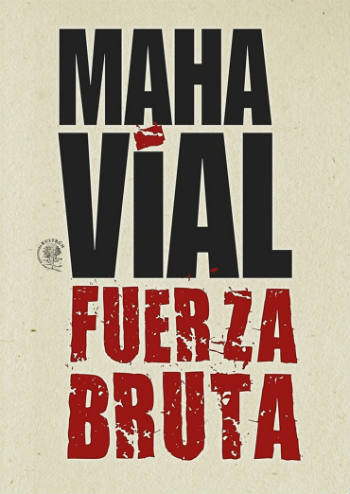Fuerza bruta. Maha Vial. Valdivia: Ediciones Kultrún. 2019. 48 pages.
 In language, human beings have constructed imaginary worlds of what we desire and what we despise. Words allow us to take refuge from the fragility of our lives, just as we come face to face with this fragility. Maha Vial, throughout her career, has put forth a militancy of body and word, committed to performance and writing, dimensiones that are fused in her profoundly critical and metapoetic voice. For Vial, the language of poetry is a form of existence that requires no artifices and no precious stones.
In language, human beings have constructed imaginary worlds of what we desire and what we despise. Words allow us to take refuge from the fragility of our lives, just as we come face to face with this fragility. Maha Vial, throughout her career, has put forth a militancy of body and word, committed to performance and writing, dimensiones that are fused in her profoundly critical and metapoetic voice. For Vial, the language of poetry is a form of existence that requires no artifices and no precious stones.
Fuerza bruta [Brute force] is made up of twenty-five untitled poems that contain within themselves the potency of a single, perfect blow. In its pages we breathe a familiar, primeval, and present air, and the body, witness and protagonist, is introduced, naked and unpolished, to pleasure as well as the vital experience of violence. This work incites us to inquire into the drive behind writing, behind taking note of one’s experience in the world, into the territory that surrounds us, and into the body. Where does this drive start and end, this “brutality,” this chewing-up and spitting-out of words to the point of exhaustion?
The effort to tell, the act of searching for and hoping to find something through language—“the hidden word” of Stella Díaz Varín—seems to come from primitive origins and to repeat itself inevitably across time. The process of creating through language is intense, and it is vital/fatal within the skin of our poet, where words know their own weight and long for their own hardness in the face of the adornment that tends to soften them. This is the source of the demand to “come at the poem / with kicks and hammers.”
The river, which appears from the first text, is an important presence in this work, along with the rain that is so characteristic of this piece of earth at the south of existence. This river—the Caucau, the Cruces, the Calle-Calle or the Valdivia—can really be any river, as long as it transmits that sensation of the tireless observer of everyday plots of the comic and the tragic—the river of blood, Violeta would say. Water, blood, and ink mix together in Vial’s stream of consciousness to reveal the labor of writing.
In this contradictory exercise, the poet finds herself: she works as a slave of the word to achieve her own emancipation; she defines herself as solitary, and equally as accompanied by some of those who have come before her in her task. In this way, although she dares to claim on one page “that behind the curtain I am / alone,” on other pages she pays tribute to Parra, Mistral, and Artaud, recognizing her complicity. We also observe a recurring motif in Vial’s poetry: an eroticism from a gendered perspective that subtly denounces the violence experienced by women: “But the brutes make / an effort / we pick up the bag / we go on like it didn’t matter / and on the way we put / on lipstick.” This act of insistence—or insolence—is a form of political resistance directed toward powers that frustrate or repress the feeling and the acting-out of freedom, an invitation to be brave and not to give in under hegemonic pressure.
Maha Vial positions herself against established norms, whether those of the order of surveillance and punishment or those of the outdated vision of critics and academics. Loyal to herself, she makes an incendiary call to mobilize legs and consciences in a dance that allows for no rhythms that cannot be danced to. If we want poetry to survive—and, above all, to live—in the midst of a system that prefers to keep it mute or motionless, we must feed its fire with the force of our own flesh. For poetry to persist in this way, “like a red-hot coal,” is not only possible, “it is the only way / possible.”
Francisco Ferrer
Universidad Austral de Chile
Translated by Arthur Dixon





